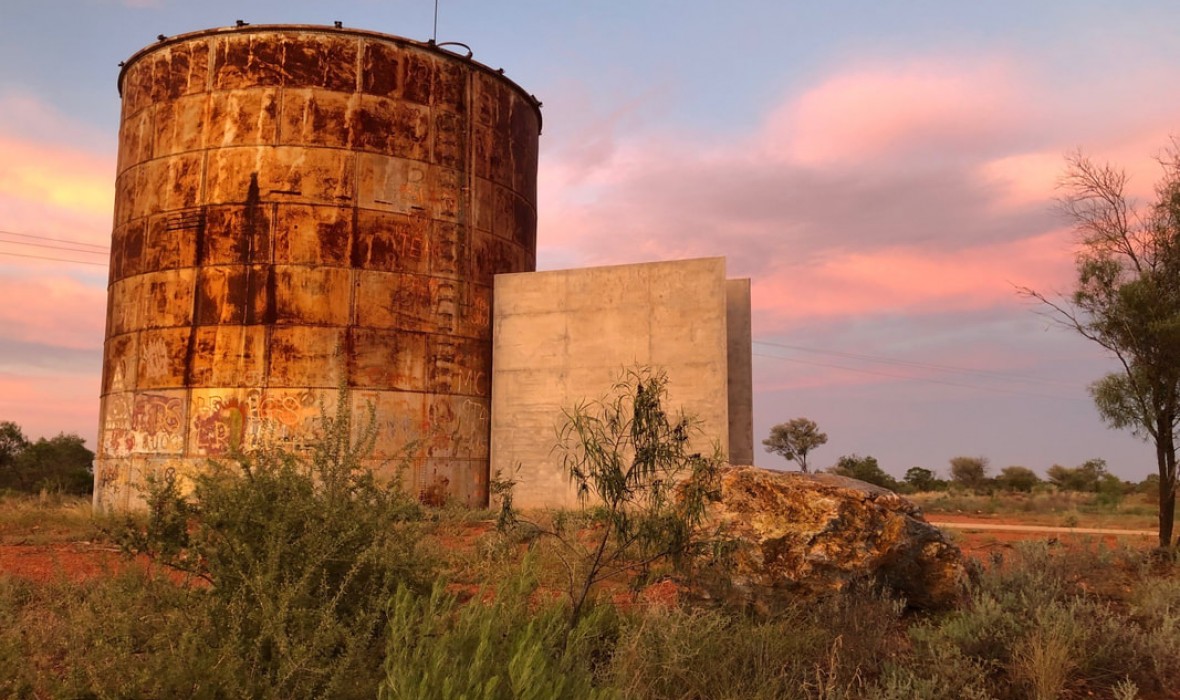
Stormtech is always proud to support innovative design and architecture, so when the opportunity arrose to support the Cobar Sound Chapel, we were happy to be apart of the project.
About The Chapel
The Cobar Sound Chapel is a permanent new sound installation, set in an old disused water tank from 1901 and inspired by the vast landscape of the Australian outback. It is cross-disciplinary, combining sound, architecture, art, poetry and the natural environment in a unique and site-specific context. It functions as a digital 4-channel string quartet lasting 24 hours, played on a loop, day and night, whether someone is listening or not.
The Cobar Sound Chapel celebrates the rugged beauty of the outback landscape and its starry night skies. Other major influences include Australian Indigenous art and culture, the art and poetry of William Blake (1757-1827), and the gritty rawness of the tank wall's grafitti art.
The Cobar Sound Chapel is a creation by renowned composer and sound artist Georges Lentz in collaboration with Pritzker-Prize-winning architect Glenn Murcutt, the outstanding musicians of The Noise String Quartet, as well as Cobar Indigenous visual artist Sharron Ohlsen. The Chapel functions as the permanent home of Lentz's digital surround-sound composition String Quartet(s) (2000-2022), a vast piece of sound art inspired by the outback landscape and its night skies.
Glenn worked with Georges to create an immersive walk-in sound installation in the shape of an intimate 5 by 5 by 5 metre concrete cube, set within the existing 10-metre-high water tank. Each of the four walls of the cube has an in-built loudspeaker, thus placing the listener sitting on the central bench right "inside the sound". The Chapel sets up a dialogue between the sound and its architectural vessel, with the sound of the music (and sometimes also of environmental noises) colouring the atmosphere of the architecture, and vice versa. Sound will also spill out of the Chapel and out of the tank into the surrounding landscape, giving the impression of a lonely 'musical water tank' in the midst of the silence of the Outback.
The Cobar Sound Chapel is located within an old graffitied water tank, on the outskirts of the town of Cobar, in central Western New South Wales. The industrial setting within the rusty old tank is somewhat reminiscent of William Blake's famous phrase of the "dark Satanic Mills" (referring to early industrialisation in England with its gruelling working conditions), and in fact a Blake quote, the beginning of his epic last poem "Jerusalem The Emanation of the Giant Albion" (1804-1820), can be found inscribed in the Chapel's north-eastern concrete wall -
"There is a Void, outside of Existence,
which if enter'd into
Englobes itself & becomes a Womb"
Indigenous art is a major influence on the music for the Cobar Sound Chapel and on Georges Lentz' music in general. It is expressed here through the inclusion of a subtle yet powerful four-part artwork found in the Chapel's four blue corner windows. The artwork is by Cobar Indigenous artist Sharron Ohlsen, a descendent of the local Wangaaypuwan Ngyiambaa people. Its haunting dot language resonates with the innumerable musical "dots" found in String Quartet(s) and adds another rich layer to the dialogue between the various elements that make up the Cobar Sound Chapel.
In terms of environmental performance, the Cobar Sound Chapel is solar/battery-powered and fully off-grid, and it will produce close to zero emissions over the course of its ongoing life. Its only power use comes from its nightly low-level LED lighting as well as from its surround-sound system. The main building material of the Chapel is reinforced concrete. Concrete per se is of course not an environmentally friendly material in its production. However, given Cobar's hot and dry climate as well as the Chapel's remoteness and expected longevity, it was considered to be the ideal choice of material for this application - concrete is extremely strong, long-lasting, fire-proof and has great thermal performance. Because of the Chapel's design with an open roof, even on a 40 degree day the inside is a good 10-15 degrees cooler all day long, without the need for any cooling device.
